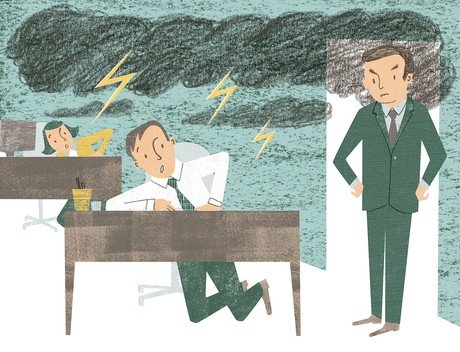Bosses beware: your bad mood is making your workers less productive

Because I am hip and cool and not even slightly out of the loop, I know that going viral is all the rage.
And what’s going viral in your office RIGHT NOW isn’t the rumour about weevils in the kitchen (because no one cares and actually weevils are surprisingly nutritious).
Instead it’s “emotional contagion”, the pass-the-emotional-parcel of office interactions. One bad mood can infect an entire team, like a rotten apple that woke up on the wrong side of the bed.
In 1994, Elaine Hatfield, John Cacioppo and Richard Rapson published Emotional Contagion, which looks at the effect our mood has on others. For example, if you smile at someone, they’ll smile back. Or, if you’re mad with rage and seeing purple, you’ll pass that on too.
Hatfield, Cacioppo and Rapson looked at how “people tend automatically to mimic or synchronise with the facial expressions, vocal expressions, postures and movements of those around them” and noted “people tend to experience emotions consistent with the facial, vocal and postural expressions [others] adopt”.
Worse, when you’re wearing your grumpy pants, your bad mood doesn’t just make your colleagues feel a bit down; it affects their work.
According to Sigal Barsade, in her October 2014 article in Psychology Today, it “significantly influences their judgement and business decisions as well. Usually without anyone having a clue what’s going on.”
Earlier, Barsade examined group emotional contagion in a study of managerial decision-making, using 94 participants who were randomly grouped in one of four experimental conditions with a trained participant to manipulate emotion (pleasant/unpleasant) and energy (high/low).
Based on the results she wrote The ripple effect: Emotional contagion and its influence on group behaviour noting in it that “people are ‘walking mood inductors’, continuously influencing the moods and then the judgements and behaviours of others”.
Yes, that’s right. Emotional contagion means that despite not owing a wand or a unicorn, you have the superpower to affect how others feel and how they work – without them realising what you’ve done. Sneaky.
Of course you can use your power for good – apparently emotional contagion works positively as well. So instead of channelling Darth Vader, search out your inner Yoda.
A June 2012 article in Scientific American by Gary Lewandowski states that if “you encounter a co-worker on a bad day, you may unknowingly pick up your colleague’s nonverbal behaviours and begin to morph into an unhappy state” but “a person can also adopt a friend or colleague’s good mood”. So if you’re around happy people, you’ll get high on that, no drugs required.
And passing on positive emotion has the trickle-down effect of improving productivity. Barsade says in The ripple effect that “the positive emotional contagion group members experienced improved cooperation, decreased conflict and increased perceived
task performance”.
In her Psychology Today article, she goes on to explain that “executives can use their knowledge of the impact of mood contagion to create more positive team dynamics, increase performance and decrease turnover by consciously managing their own emotions and the emotions they want to spread”.
So creating a positive office culture doesn’t depend on hiring Stepford wives – it just requires some basic emotional management. Instead of spreading the common cold this winter, try spreading positivity.
Go on, put on a happy face. ?




